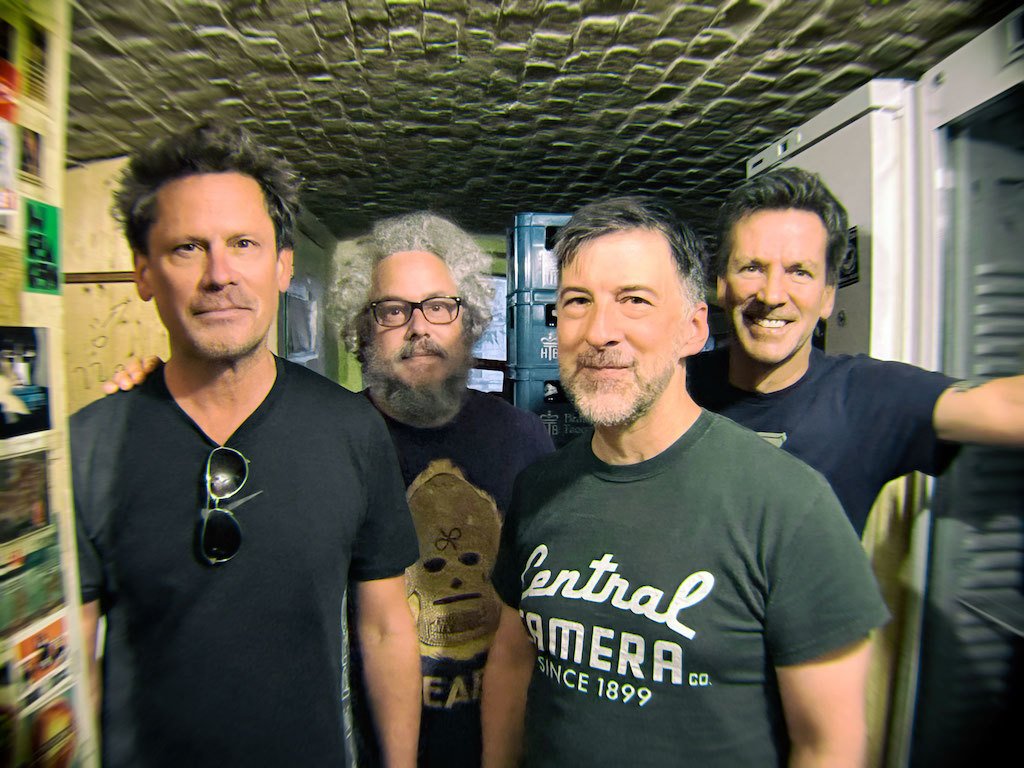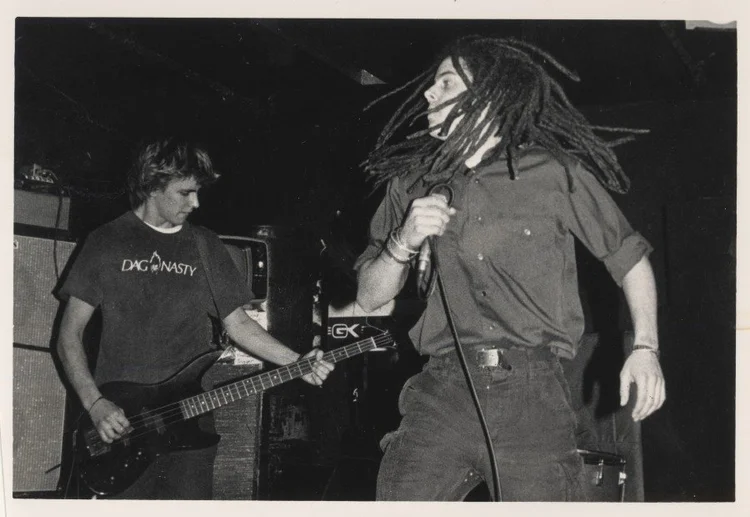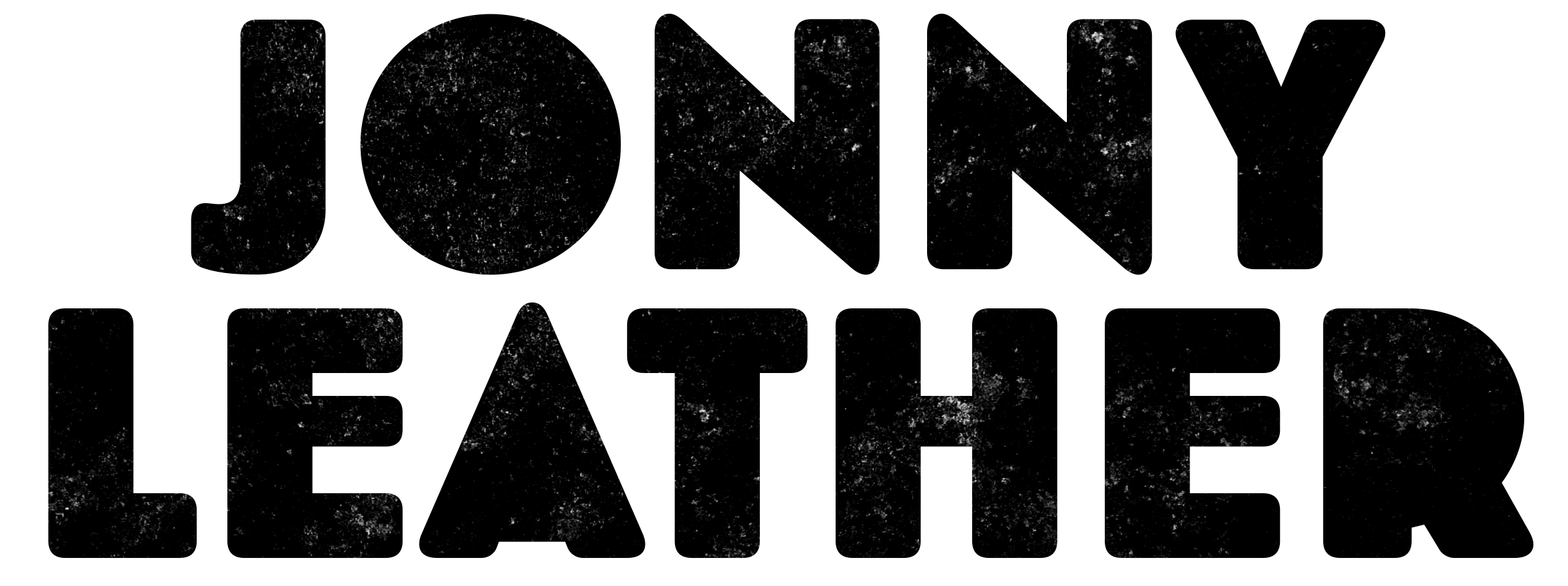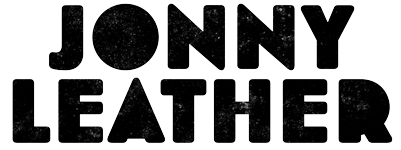
Soulside
Asheville locals may recognize Bobby Sullivan as the general manager at the French Broad Food Co-Op, but in another time — the mid-late 1980s — he was the energetic frontman for legendary Washington, D.C.-based post-hardcore band Soulside.
Recently reunited and touring in support of a new album, A Brief Moment in the Sun, Soulside will finally make its Asheville debut on Sunday, March 19, at The Grey Eagle, over three decades removed from the quartet’s original run. The evening will give Sullivan a long-awaited opportunity to perform in front of friends and family in the city he’s called home for over 20 years.
Originally formed under the moniker Lunchmeat in 1985 by Sullivan and high school friends Scott McCloud (guitar/vocals), Alexis Fleisig (drums), and Chris Thompson (bass), the band became Soulside in 1987 after bassist Johnny Temple was recruited to replace Thompson, who’d departed to start the band Ignition. In the short span of three years, the group managed to release two full length albums, as well as a pair of EPs. Similar to many peers from the same D.C. scene, a DIY spirit and passionate socio-political views were at the center of Soulside’s brand of punk, which even led the band to perform an illegal concert in East Berlin prior to the fall of the Iron Curtain.
When Soulside disbanded in 1989 due to artistic differences, McCloud, Temple, and Fleisig went on to form Girls Against Boys with Eli Janney. Meanwhile, Sullivan played with 7 League Boots and a few other projects before eventually shifting his focus to food equality.
Twenty-five years after disbanding, the quartet regrouped in 2014 to play a special party for the release of the Salad Days documentary, and then once again reunited in 2017 for McCloud’s 50th birthday. In the years that have followed, the quartet began to tour once again and started writing new music together, resulting in the 2020 EP This Ship, and then A Brief Moment in the Sun in 2022. Produced by tourmate J. Robbins (Jawbox; Burning Airlines), the new music perfectly picks up where the band left off in 1989 without just retreating to the safety of rehashing old ideas.
Sullivan and McCloud each took some time to answer some of Asheville Stages’ questions about Soulside’s reunion and the group’s first ever Asheville show.
Jonny Leather: What was the catalyst for reuniting Soulside?
Scott McCloud: I think it started with the release of the Salad Days documentary? Around the opening nights of the film there were two shows planned at the Black Cat in D.C., and Soulside reunited for that, which I believe was the first time we’d played in like 25 years. After that, we started doing more stuff in bits and pieces. We played my 50th birthday party show in Prague [2017], and played some short tour dates. We recorded a 7” [This Ship] and things continued to gel.
JL: Considering that you’re all spread out all over the map, what was the writing and recording process like for A Brief Moment in the Sun?
SM: Johnny was first to suggest, during COVID lockdowns, that we start writing new material virtually — sending tracks to one another. We set up Zoom chats on two Saturdays a month — which was essential — to discuss the ideas we were generating. We weren’t necessarily making an album at first but it snowballed quickly into a lot of material. And the Zoom calls kept us all motivated.
JL: Was it challenging to rekindle the energy and sound of Soulside while also being true to where you’re all at now?
SM: What was interesting to me, personally, was channeling back into the very physical way I played guitar in Soulside. On the first few shows, I was using basically my GVSB [Girls Against Boys] set up — which included some pedals and things — but I found that it didn’t work with Soulside. I needed more freedom of movement. So that was an interesting revelation to me. I abandoned all the pedals and just started plugging directly into the amp and got a lot more physical with the guitar, which in turn has influenced my playing across the board. To go back to being the guitar player —and not the lead vocalist at the same time — has been a bit of a personal and unexpected revelation.
JL: Artists are always their own worst critics, so digging so deep into the past can be rough. Are there any specific songs that you’ve gained new appreciation for since starting to play them live again?
SM: For me, going back to all the Soulside stuff I kind of see two phases. The early stuff, up through Less Deep Inside Keeps, is more standard punk of the time period in D.C. But as our touring expanded, so too did our sound evolve, taking in wider influences. With Trigger, and especially Hot Bodi Gram, we departed pretty far from that original sound. It’s definitely post-punk.
I also have a new perspective and appreciation on how socially political our music was, especially Bobby‘s lyrics. Around the time of Hot Bodi Gram, I wanted to go a different direction — and I did with GVSB — but looking back, I’m really proud of the fact that Soulside’s music was quite politically-motivated and continues to be today. I suppose it does have something to do with age. [laughs] I’m more comfortable with the idea of wearing different hats, so to speak.
JL: J. Robbins produced A Brief Moment in the Sun and will be joining you guys on this tour as support. You were obviously both part of that legendary ’80s D.C. punk scene. When did you originally connect, and have you stayed close over the years?
SM: I remember meeting J. around the time he was playing bass in Government Issue. I moved to NYC in 1989, but in the early ’90s, Girls Against Boys played with Jawbox quite often. (We did a whole U.S. tour with them in 1994). I’d categorize it as staying in similar orbits. J. was wonderful to work with on the new album — tirelessly motivated to help us achieve what we wanted. Incidentally, his studio — the Magpie Cage in Baltimore — used to be called OZ before J. took it over some years ago. GVSB recorded two of our records [Venus Luxure No. 1 Baby, and Cruise Yourself] at the same studio in ’92 and ’94, respectively. So it was a trip to be recording there again after so much time.
JL: During your 1989 European tour, you played a secret show in East Berlin. How’d that even come together?
SM: We did that whole gargantuan tour through the help of friends and very DIY promoters and contacts. Crazy to think back on how it was even possible. Fugazi had been over in ’88, I think, so we followed their footsteps, but also allowed for a much much longer tour. (In the end, it was about three months and included recording Hot Bodi Gram in Holland at the end.)
And yes, a major part of the experience was playing in East Berlin and Poland prior to the fall of the Berlin Wall, and to play in West Berlin as well at that time. It was like driving directly into history — the heart of the Cold War. Looking back on it, it’s hard to believe we were there crossing Checkpoint Charlie. It was organized by DIY punks in East Berlin. We couldn’t bring guitars nor say we were playing. But the people at the show told me the Stasi were “watching” and not to go walking even a block from the little basement we were playing in. Yeah, it was like witnessing some big part of history.
JL: You, Alexis, and Johnny have also been back on the road with Girls Against Boys. Is there any new material on the way?
SM: I wish I could say there was! We actually have a fair amount of material that we were working on at the same time as the new Soulside stuff. While we were all contributing to Soulside, I was finding some of the ideas that I was generating didn’t seem to fit as well into Soulside — or just felt more like I wanted to put aside for GVSB. I remain hopeful! We will see.

Jonny Leather: Bobby, how has it been reconnecting with the rest of Soulside after all of these years?
Bobby Sullivan: It’s been an amazing experience! It turns out all those songs I’d long let go of were still very much a part of who I am today. I remember the first practice we did leading up to our performance at the D.C. premiere of the Salad Days documentary [in2014], because it felt like the hair on the back of my neck stood straight up as the others broke into the first song.
And it’s one thing to retrace all those steps we took so many years ago playing old songs, but making new music has been truly special, and really a dream come true. I’m thankful to have such an amazing outlet for all the things I want to write about and sing about. Traveling together on tours has been great, too. We have inside jokes that go back to elementary school!
JL: The rest of the guys continued on as Girls Against Boys after Soulside disbanded. In reuniting, was it challenging for you to build up a level of comfort in performing with them and writing the new material?
BS: It’s pretty amazing that these guys have been playing together pretty continuously for, like, 37 years. I think that makes me the lucky one. I got to step back into something that’s been ongoing and has the character of being like its own organism — their music and how well it all fits together. And they all have multiple other bands, so they’re not trying to get everything they want out of Soulside. It can be its own thing.
And stepping back into it for me was flat out exhilarating. We’ve been quite active in Europe, playing in Greece, Poland, Croatia, the Czech Republic, Austria, and Germany, as well as the UK. We all work, so we do short trips. Now that the new album is out, we’ll head overseas again after this upcoming tour of the eastern U.S..
JL: This will be Soulside’s first ever Asheville show. How does it feel to be playing for your local friends and community who may not have ever heard Soulside?
BS: I think this is going to be the funnest show on the tour for me. It’ll be interesting to see who shows up. My life as a musician has been very much in the background of my retail life in Asheville. Most people know me as a food merchant, as I’ve been doing it here for 25 years now. I’ve seen a lot of my friends’ kids grow up — along with my kids — and it’s very cool when they are the ones tuning in to the music I did, and really the significance of the D.C. scene and all the great bands that came out of that. The Grey Eagle is a great venue, so I’m pretty happy we’re playing there.
JL: Prior to the punk era, especially the D.C. scene you were a part of, politics rarely found its way into music. Were there any specific bands who informed you politically at the time, and inspired you to write socially-conscious lyrics?
BS: Before I got into punk music, reggae and ska were my mainstays. So, I’ve kind of always been into music with socio-political themes. And the punk that I like is pretty political, too, like the Ruts, the Clash, and most of the Rock Against Racism bands in England. From a young age I had the perspective that by amplifying your voice, there’s a responsibility that goes with it. That you should be working to make things better and that you can’t be just a voice. You have to do things, too, to make the world a better place.
That’s how I got into so much food activism. I talk a lot about that in my book, Revolutionary Threads. One of the bands that really championed that perspective in D.C. at the time our band was coming up was Beefeater. Tomas [Squip (now Onam)] was a spiritual force. He got a lot of us focused on trying to change things we saw that didn’t seem right. As I remember it, it was he who started the punk percussion protests at the South African embassy. It became a percussion protest, because people weren’t allowed to get anywhere near the embassy to protest the Apartheid regime and the imprisonment of Nelson Mandela. By launching a percussion protest, at least they could hear us.
JL: How did your involvement in the music community when you were young later inform your organizing skills as an activist?
BS: The example Ian [MacKaye] and Jeff [Nelson] set with D.C. label Dischord Records has influenced countless people to defy the typical capitalist model and run businesses that aren’t interested in selling out and/or driving exorbitant profits to stockholders or business executives at the expense of the workers. Running a co-op is right up my alley in that sense. It’s amazing that this community-based organization and enterprise owns almost 1.5 acres in downtown Asheville. And it really can’t be sold the way Green Life was when Whole Foods bought it. It would take a vote by over 1,000 local owners to make that happen.
Instead, we have the total autonomy to run the business the way the board — made up of local citizens — sees fit. We have the highest entry-level wage of any grocery store in town, and we worked hard to put together a Double Up Food Bucks program that is federally funded and gives food stamps users store credit when they buy fresh food — up to $20 a day — to spend on more fruits and vegetables. It’s truly a labor of love, and the store is thriving thanks to our recent expansion. And we’re not done. The store will double in size over the next few years, creating more jobs and better access to the kind of prices people need to match their family’s needs.
JL: For as progressive as Asheville may seem to some outsiders, it has its fair share of issues. If you could change anything about this city, what would it be?
BS: There’s a lot I don’t understand about the way Asheville has developed over the years. The lack of diversity here has always been jarring. But coming from D.C., my expectations are probably a bit out of context. I get the gentrification thing; that’s going on everywhere. But the one thing I really don’t get is the lack of diversity among the tourists.
I’m downtown almost every day, and the people coming here to visit appear to be quite the homogenous group. Meanwhile, there’s a lot of diversity in affluent cities pretty close by, like Atlanta or Charlotte. Why don’t our visitors reflect that diversity? If we were getting a more diverse group of visitors, maybe we’d get a more diverse group moving here, but I don’t see that happening. I don’t think I can change that, or the fact that tourism is such a prized economic driver. But if I could, I would change both.
IF YOU GO
Who: Soulside + J. Robbins (Band)
When: Sunday, March 19, 8 p.m.
Where: The Grey Eagle, 185 Clingman Ave., thegreyeagle.com
Tickets: $17
(Photo courtesy of Soulside)



